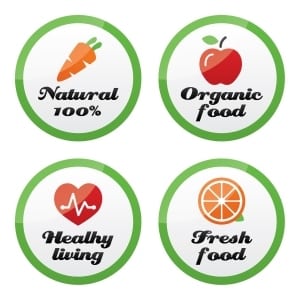Many nutrition buzzwords get thrown around. Three big ones right now are organic, local, and plant-based – all words you may have seen in articles and food labels but perhaps wondered what they meant. Are they all buzz, or do they represent something more? This month, I’d like to shed some light on the meaning of the words you are hearing and offer up suggestions on why they may make a big difference in your diet and, ultimately, your body image.
Nutrition Buzzword #1: Organic Foods
The national organic program is run by the USDA. It provides regulations for organic foods, such as farming practices for produce, livestock feeding, and living requirements, and even labeling requirements for processed, multi-ingredient foods. A recent study published by JAMA Internal Medicine found that in over 68,000 individuals studied, those who consumed organic foods had a lower incidence of certain cancers. Other studies have found that organic foods have more disease-fighting nutrients than those treated with pesticides.
I often tell my patients that we should all eat organic in an ideal world. However, the world as we know it is not ideal, and things like personal budget and availability can determine how often you eat organic foods. The most important organic foods to choose are those identified by the Environmental Working Group as the “dirty dozen.” This organization releases the list each year based on testing foods with the most pesticides. You can access the list here and even get a peek at the 15 foods that are the cleanest as well! In addition to the dirty dozen, I encourage my patients to consider organic soy and dairy as well.
Nutrition Buzzword #2: Local
Locally sourced foods are a little easier to understand and identify. They usually include food grown within 100 miles from the point of purchase and help the environment and business in your backyard, which can indirectly help you by boosting your local economy.
A new study looked at availability vs. demand in major metropolitan areas to determine if eating all local foods was possible based on the current supply chain of how we obtain food. The study found that eggs and dairy tended to be the foods most likely obtained to be locally, followed by fruits and vegetables, but that consumers could not always find these local options to buy.
What can you do to eat more locally? It might involve getting out of the grocery store and getting out in the community to farmer’s markets and co-ops. You can also look for “local” signs in stores in your area that sell food. A local choice is a sustainable one, no doubt, but it may not necessarily mean a healthier option for you and your family. Local foods may not all be organic and may not always be the best for your health, so seek out local when you can, but know that fruits, vegetables, beans, whole grains, and lean sources of protein will be your best bets.
Nutrition Buzzword #3: Plant-Based
This is an easy one. Plant-based foods are any foods that are, in fact, plants. That means if food has fins or legs, it doesn’t fit in the plant-based category. The studies showing the benefits of a plant-based diet are numerous and identify key health indicators for those that follow the pattern, such as a decreased risk of multiple chronic diseases, including cancer, and increased longevity. If a plant-based approach appeals to you, start small by cutting out red and processed meat (including pork), and fill up on more fruits and vegetables. I recently wrote an article on the benefits of a plant-based diet and ways to adhere to one. You can get more tips here.
In 2019, we will focus on breaking down the barriers that prevent us from eating healthily. I will be covering the ways in which our social circles and environment impact our eating habits, the latest trends in foods you need to know about, how to manage your weight past the age of 40, and so much more! See you in 2019!
Kristin Kirkpatrick, MS, RDN, is a Senior Fellow with Meadows Behavioral Healthcare focusing on wellness and nutrition. For more information: www.kristinkirkpatrick.com



